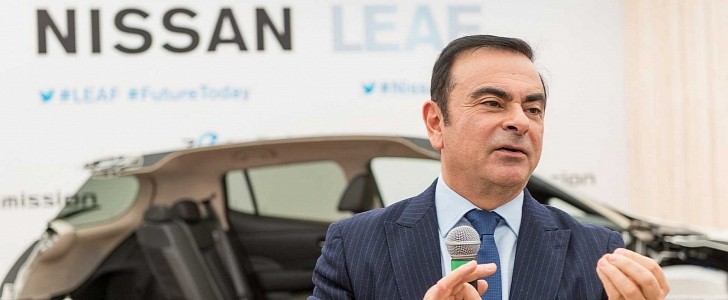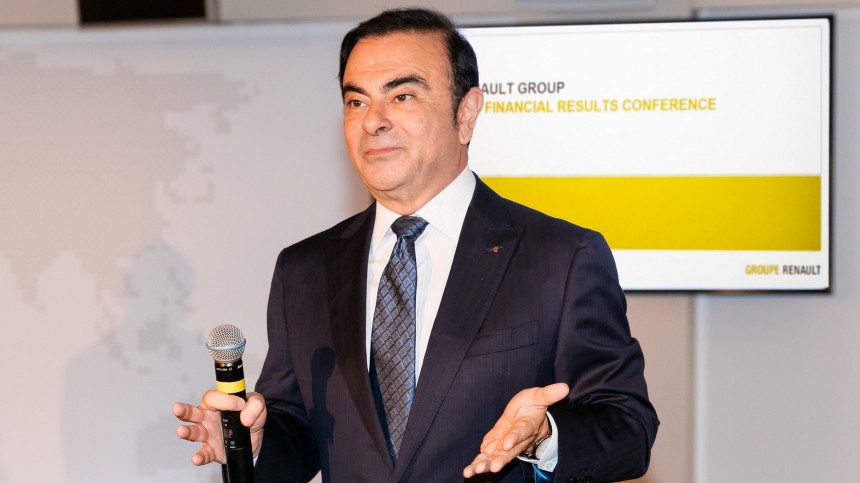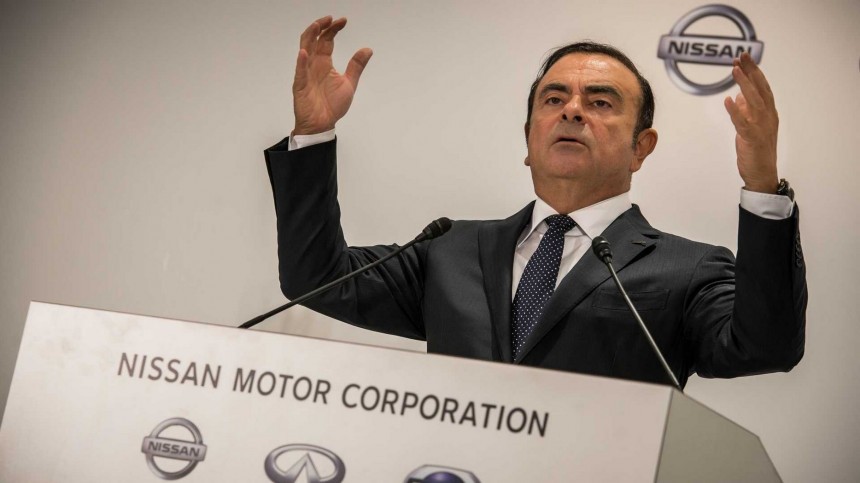When Carlos Ghosn arrived at Nissan in 1999, only 3 of the 46 models it sold in Japan generated profits. The company had a debt of more than $20 billion and a paid ticket to bankruptcy. Turning its fate around was deemed impossible, but Ghosn brought it back to profits in one year and finished his “Nissan Revival Plan” by delivering one of the most profitable automakers in the world. That was as spectacular as everything that followed his prison in 2018, including his escape from Japan. In an interview with Fox Business, he repeated that he was a plot victim and that his work is now lost, with Nissan getting back to being the “boring, mediocre car company” he helped to fix more than 20 years ago.
Ghosn talked with Maria Bartiromo (yes, that one from the Ramones song) about his new book. The executive wrote “Broken Alliances: Inside the Rise and Fall of a Global Automotive Empire” to tell the whole story as he lived it and the reasons why he believes that he was arrested.
The corporate conspiracy would have emerged after Ghosn tried to create a more stable structure than the Alliance he built to keep Nissan, Renault, and Mitsubishi together as one of the major car manufacturers in the world. The three companies were independent, and Ghosn was the main link among them. If he decided to retire, for example, the Alliance would be in jeopardy. At the same time, taking care of three different carmakers at the same time was complex, to say the least.
A simple merger would not be acceptable. Renault’s major shareholder is France. The Japanese government did not want a foreign country controlling one of its major companies. When he was arrested on November 19, 2018, Ghosn was trying to engineer a deal that would suit all the shareholders and interests involved. That was the main target of his then recently renewed contract as Renault’s CEO: to make the merger irreversible. Ghosn talked about that in some interviews at the time, which made these intentions public.
Later reports about the whole situation show that Ghosn has his reasons to believe in a plot. Automotive News wrote about Hitoshi Kawaguchi’s statement to Japanese courts during Greg Kelly’s trial. Kelly was Nissan’s human resources officer, and he was arrested with Ghosn. Kawaguchi is the former Nissan senior vice president for government relations.
According to Kawaguchi, he and two other Nissan executives were against the merger: Hidetoshi Imazu, Nissan’s Statutory Auditor, and Hari Nada, head of the CEO office at the company. By then, Ghosn was not in charge of Nissan anymore: he named Hiroto Saikawa Nissan’s new CEO starting on April 1, 2017.
Kawaguchi, Imazu, and Nada decided to start investigating alleged misconducts from Ghosn and met two or three times a week to discuss their findings. In July 2018, Imazu took the information they gathered to Japanese prosecutors.
According to Kawaguchi, who retired in 2020, none of the allegations against Ghosn was fabricated. He also told the judges that they were not meant to stop the merger. The fact that they did would have been just a coincidence.
That’s not what Ravinder Passi’s statement suggests. The British lawyer was working at Nissan's global general counsel, leading a team of 250 people. In an interview published by BBC on August 4, he said that Nada called him to his office and warned him that Ghosn would be arrested in a rather public way, conceived for maximum publicity. Ghosn and Kelly – Nissan’s only American director at the time – had been called back to Japan for an urgent meeting with high-level executives that would never happen.
Nada had already struck a deal with prosecutors to grant him immunity. Passi said that the Japanese executive had conceived the financial arrangements that Japanese prosecutors deemed as illegal. That was a massive red flag for the British lawyer: people involved with crimes should not be part of the investigation process but their very object. Saikawa had also signed documents authorizing the alleged illegal payments to Ghosn.
Passi tried to warn Nissan’s head of audit committee – possibly Imazu – then the company’s independent directors about what happened. He was then removed from the investigation about Ghosn and relieved of his duties. After a while, Passi and his family were forced to leave Japan, not before having his house raided by court officials and Nissan staff. They got back a laptop and a telephone that contained evidence against Nissan executives.
After Ghosn ended up in jail, Passi said multiple foreign executives left Nissan. In his interview with Fox Business, Ghosn mentioned some of them, saying they left soon after his arrest. Regarding his escape, Ghosn said he tried it after he realized he would not have a fair trial. He felt that the prosecutors were ruling everything. Japanese criminal courts are notorious for conviction rates of 99%. In other words, prosecutors almost never lose.
For Ghosn, it was clear that the Japanese government wanted to keep him away “for as many years as possible” to ensure Nissan would still be a Japanese company. He would not have even been authorized to hire an independent translator so that he could follow the hearings. The one Ghosn had was hired by the prosecutors.
When he said that Nissan was back to being the “boring, mediocre car company” from 1999, Ghosn said that with evident frustration. For him, everybody involved is losing: the Japanese government and the country's legal system’s reputation, France, Nissan, Mitsubishi, Renault, and the shareholders.
Instead of strategic plans, these companies would now be organizing their retreat, lowering production volumes, and focusing on more profitable vehicles solely to stay alive. For companies that united once were one of the major car manufacturing groups in the world, that's more than a frustrating conclusion: it's melancholic.
The corporate conspiracy would have emerged after Ghosn tried to create a more stable structure than the Alliance he built to keep Nissan, Renault, and Mitsubishi together as one of the major car manufacturers in the world. The three companies were independent, and Ghosn was the main link among them. If he decided to retire, for example, the Alliance would be in jeopardy. At the same time, taking care of three different carmakers at the same time was complex, to say the least.
A simple merger would not be acceptable. Renault’s major shareholder is France. The Japanese government did not want a foreign country controlling one of its major companies. When he was arrested on November 19, 2018, Ghosn was trying to engineer a deal that would suit all the shareholders and interests involved. That was the main target of his then recently renewed contract as Renault’s CEO: to make the merger irreversible. Ghosn talked about that in some interviews at the time, which made these intentions public.
According to Kawaguchi, he and two other Nissan executives were against the merger: Hidetoshi Imazu, Nissan’s Statutory Auditor, and Hari Nada, head of the CEO office at the company. By then, Ghosn was not in charge of Nissan anymore: he named Hiroto Saikawa Nissan’s new CEO starting on April 1, 2017.
Kawaguchi, Imazu, and Nada decided to start investigating alleged misconducts from Ghosn and met two or three times a week to discuss their findings. In July 2018, Imazu took the information they gathered to Japanese prosecutors.
According to Kawaguchi, who retired in 2020, none of the allegations against Ghosn was fabricated. He also told the judges that they were not meant to stop the merger. The fact that they did would have been just a coincidence.
Nada had already struck a deal with prosecutors to grant him immunity. Passi said that the Japanese executive had conceived the financial arrangements that Japanese prosecutors deemed as illegal. That was a massive red flag for the British lawyer: people involved with crimes should not be part of the investigation process but their very object. Saikawa had also signed documents authorizing the alleged illegal payments to Ghosn.
Passi tried to warn Nissan’s head of audit committee – possibly Imazu – then the company’s independent directors about what happened. He was then removed from the investigation about Ghosn and relieved of his duties. After a while, Passi and his family were forced to leave Japan, not before having his house raided by court officials and Nissan staff. They got back a laptop and a telephone that contained evidence against Nissan executives.
For Ghosn, it was clear that the Japanese government wanted to keep him away “for as many years as possible” to ensure Nissan would still be a Japanese company. He would not have even been authorized to hire an independent translator so that he could follow the hearings. The one Ghosn had was hired by the prosecutors.
When he said that Nissan was back to being the “boring, mediocre car company” from 1999, Ghosn said that with evident frustration. For him, everybody involved is losing: the Japanese government and the country's legal system’s reputation, France, Nissan, Mitsubishi, Renault, and the shareholders.
Instead of strategic plans, these companies would now be organizing their retreat, lowering production volumes, and focusing on more profitable vehicles solely to stay alive. For companies that united once were one of the major car manufacturing groups in the world, that's more than a frustrating conclusion: it's melancholic.










